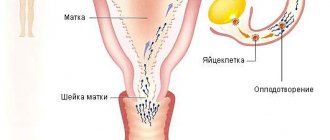Natural immunostimulant during pregnancy - persimmon
Pregnant women should not take many medications throughout their pregnancy.
Both ordinary nasal drops for nasal congestion and immunity-boosting drugs are prohibited. But it is during pregnancy that the body is exposed to many diseases; women often suffer from ARVI, colds or flu.
Persimmon contains a huge amount of vitamin C and D, which helps normalize metabolism and also helps strengthen the immune system without using pharmaceutical drugs.
Persimmon is recommended for consumption by pregnant women with heart disease, blood vessels, and excess weight.
Persimmon during pregnancy: benefit or harm? Composition of persimmon
Fruits are an essential component of a balanced diet.
During pregnancy, it is more important than ever for a woman to saturate her body with vitamins and nutrients. Each fruit, like all foods in general, has a specific effect on the body. Today we will take a closer look at how persimmon affects it during pregnancy. Most experts have come to the conclusion that pregnancy does not require you to give up most foods.
There are unacceptable foods such as alcohol, processed foods, sausages and hot spices. Products from this list should not be consumed, even if you are not pregnant - it will “backfire” on your health in any case.
The main rule of nutrition during pregnancy is balance. Some foods cannot be included in the diet in the first months, but they will be very useful before childbirth.
Persimmon contains a rich vitamin complex - A, B, C and many others.
- Vitamin A or carotene is important for supporting vision, the beauty of the expectant mother's skin and nails, and the development of the baby's central nervous system.
- Vitamin C will strengthen the immune system.
- B vitamins normalize carbohydrate and fat metabolism in the body of a pregnant woman.
- Vitamin PP will help fight fatigue and possible depression. It improves blood circulation. And in the process of formation of fetal hematopoiesis, folic acid will help.
- Folic acid deficiency increases the risk of developing pathologies of the brain and neural tube of the embryo.
- The amount of potassium in persimmons is enough to balance hydration and support the heart.
Products containing potassium are necessary in the third trimester. It will ease the condition of the gastrointestinal tract when the fetus has already gained sufficient weight and is compressing the mother’s internal organs.
Persimmon is useful for swelling. It removes excess water from the body.
For the proper development of the baby’s musculoskeletal system, mommy needs to consume foods high in potassium and phosphorus; these elements are also responsible for the strength and health of a pregnant woman’s tooth enamel.
Magnesium will be beneficial for blood vessels and nerves. It gives tone to the uterus, warning about premature birth.
One persimmon fruit covers 20% of the daily requirement of magnesium.
For the full development of the baby, the body needs iodine. This element promotes the development of the fetal nervous system.
Insufficient iodine can cause:
- problems with the thyroid gland of the mother and baby after birth;
- decline of immunity;
- child dementia.
It is enough for a pregnant woman to eat 200 g of persimmon per day to replenish iodine deficiency in the body. For the mother, consuming iodine-containing products is also beneficial: they improve mood, performance and have a beneficial effect on intelligence.
To check at home whether a persimmon contains enough iodine, you need to cut the fruit and leave it for a while. Darkening of the section will indicate the presence of iodine.
Persimmons appear on the shelves along with the cold outside the window. During this period, you just need to get ahead of the curve and defeat vitamin deficiency. Persimmon will help you with this.
Let's look at all the nuances of this fruit.
Benefit
Persimmon contains fiber and pectins. These substances improve digestion and quickly remove toxins from the body. This helps improve the pregnant woman’s appetite and strengthen the immune system, which protects the expectant mother and her baby from infections and diseases.
Persimmons contain a large amount of calcium. 100 grams of persimmon contain about 120 mg, which is the daily requirement for a healthy person.
Calcium from persimmons is preserved by heat treatment, drying or freezing the berries.
Vitamin C contained in persimmons is necessary for the body, especially in winter. It not only strengthens the immune system, but also helps iron digestion
Persimmon is a mild diuretic for removing excess fluid and eliminating swelling.
During pregnancy, a woman's body begins to work at a new pace. Changes also affect metabolism. Therefore, when it comes to nutrition, it is important to remember that even the healthiest foods should be consumed wisely and in moderation.
Pounds of persimmons can lead to an allergic reaction, cause heartburn and increase gas levels in the body.
Eat a few persimmons as a snack in between. If your craving for persimmon is insatiable, the maximum quantity is 4 pieces.
To remove the astringency, put the persimmon in the freezer for a day.
Tannin can help with an upset stomach, but if the body is prone to constipation, then choose ripe persimmons or the Sharon persimmon variety.
Persimmon is contraindicated for people with diabetes, especially if it concerns a pregnant woman.
Persimmon should not be overused. It can be included in the diet if there are no contraindications for a pregnant woman.
In the first weeks of pregnancy, persimmons should not be consumed in large quantities. A large amount of vitamin A in the diet can lead to pathologies of the baby’s central nervous system and face. Half a persimmon fruit per day will be enough for the proper development of the embryo.
Starting from the second trimester, you can increase the amount of persimmon to one whole fruit. Often pregnant women suffer from gastrointestinal problems, so it is important to consult with a leading doctor.
To protect yourself and your baby from negative consequences in the form of infections and problems with gastrointestinal functions, buy fruits in trusted places.
Conclusion
Each period of pregnancy has its own nutritional recommendations, but fruits should be present throughout pregnancy.
The It`s kids team hopes that we have answered the question: “Can pregnant women eat persimmons?”
Eat right and you will ensure good health for yourself and your baby.
Persimmon is a berry with a sweetish taste. It grows in countries with a subtropical climate. It has a rich nutritional and vitamin composition, therefore it is often used as a substitute for pharmaceutical vitamins during diets and pregnancy, when the body needs them.
The peculiarity of the berry is that it requires compliance with certain transportation conditions. Therefore, high-quality and tasty - it is expensive.
This is exactly what you should give preference in order to saturate the body with the beneficial substances it contains:
- Vitamins: A, C, B1, B2, nicotinic, folic acid.
- Microelements: potassium, iodine, calcium, magnesium, iron, manganese.
- Pectin.
The attitude of nutritionists towards persimmons is not always clear. Despite the significant number of positive properties, experts warn that there may be unwanted reactions associated with eating the berry during pregnancy:
- Constipation. The development of such a disorder is facilitated by the tannins that are included in the composition. Women who are prone to stool retention should use persimmon with caution.
- Rapid weight gain, diabetes. The berry contains a large amount of glucose, which increases its calorie content.
- Dental problems. Fructose and sucrose cause damage to enamel and accelerate the development of caries.
- Intestinal obstruction. This can be caused by eating persimmons with the peel. It contains a large amount of tannin, which, when interacting with gastric juice, can lead to the formation of a sticky substance that can block the intestinal lumen.
- Allergic reactions. Their development is possible if the berry is abused. You should not exceed the recommended amount for a certain period of pregnancy.
A single consumption of the berry in large quantities will not cause significant harm. But you shouldn't do this all the time.
Like any exotic, persimmon can cause allergies: start with small portions and monitor the condition.
In addition, an overdose of vitamin A (beta-carotene) is much more dangerous than its deficiency - both for the mother and for her little one. Therefore, be careful and observe moderation: do not eat persimmons in kilograms!
Pregnant women suffering from constipation should not eat persimmon, especially if the fruit is not ripe enough and is very astringent.
Don't forget that sweet fruit is very high in calories. If the doctor observes excess weight, he will advise you to hold off on the delicious treat. Diabetes mellitus in a pregnant woman will be a serious contraindication for use.
Nourishing masks are obtained from persimmon pulp by grinding the fruit. The result will not take long to arrive. The surface of the dermis will become soft, cleared of pimples, blackheads, and get rid of dryness. The structure of the plant contains collagen.
It will make the skin elastic and elastic. She is stressed during pregnancy. The mask will help her relax. The skin is also deformed in the peritoneal area. Of course, persimmon is not able to prevent such complex changes on its own.
But in combination with other, more intense methods, it improves her condition.
Other fruits are added to taste.
You need to be extremely careful when eating fresh fruits if you have serious diseases of the digestive organs. With high acidity, doctors recommend steaming the fruits. This will prevent the disease from getting worse.
Let's sum it up
So, pregnant women can eat persimmons, most importantly, in moderation. And only if you have eaten it before and you like its taste. The beneficial substances it contains can also be found in other fruits. After all, right now, when a new life is developing in you, fruit should always be in the house!
Persimmon: a storehouse of vitamins
The value of the fruit is due to its positive effect on the functioning of the heart, kidneys, liver, and stomach. When consuming persimmon, there is a decrease in blood cholesterol and normalization of metabolism. Cardiologists say that by consuming 2 persimmons per day, you can reduce the load on the heart muscle, thereby preventing swelling and fatigue in the legs.
Additional vitamin value:
- Retinol is a preventive agent for eye diseases, promotes the production of natural tears, and moisturizes the mucous membrane of the eye.
- Calcium and beta-carotene are good for tooth enamel.
- Dietary coarse fiber (fiber) helps normalize the digestive system and fight stool disorders.
- Iodine helps with diseases of the thyroid gland and supplies the organ with the necessary vitamin.
- The minerals magnesium and potassium are essential for the urinary system. They help remove excess fluid and eliminate swelling of the limbs.
- Vitamin B is responsible for the production of the hormone of happiness - endorphin.
- Ascorbic acid is a prophylactic agent to prevent pneumonia and bronchitis.
- Iron helps prevent anemia, which is common in late pregnancy.
- P and PP, SS supply the blood with oxygen and increase their elasticity. They are a preventative against high blood pressure.
The microelements and vitamins contained in persimmons prevent the heart from wearing out.
Persimmon during pregnancy: benefit or harm? Composition of persimmon
The sweet berry contains a huge amount of nutrients, minerals and vitamins. Their complex has a positive effect on the growth and development of the fetus. However, in any case, you should consult a healthcare professional. Only he will be able to objectively assess the possibility of using the product.
The pulp of the plant contains vitamins A, B1, B2, and C that are important for a pregnant woman’s body. Carotene or vitamin A is needed for the functioning of the visual system, skin, development of the nervous system and internal organs of the child. Ascorbic acid enhances the activity of the immune barrier.
Thiamine or vitamin B1, contained in persimmons, helps normalize carbohydrate and fat metabolism during pregnancy. Riboflavin affects the health of a woman's skin and hair. To combat overwork and depression, vitamin PP will help a pregnant woman. It participates in energy metabolism, optimizes blood circulation and microcirculation.
Potassium affects the balance of water balance and the functioning of the heart organ. The element is especially necessary in the 3rd trimester. It improves digestion processes. At the end of pregnancy, a woman feels discomfort, because the fetus is already heavy and puts pressure on the internal organs of its mother.
Persimmon removes excess fluid from the body, preventing swelling, which often plagues pregnant women. They are strongly recommended to consume foods containing phosphorus and calcium during this time. After all, they influence the formation of the baby’s musculoskeletal system and the quality of the mother’s tooth enamel.
The fetus developing in the womb is in dire need of iodine and iron. The first takes part in metabolic processes and the development of the baby’s nervous organization. Lack of iodine can lead to:
- pathologies of the thyroid gland in adults and children in the future;
- the occurrence of dementia in an infant;
- deterioration of the immune system.
Pregnancy may become more difficult if there is insufficient iron. This will lead to anemia and oxygen starvation of the fetus. The latter condition is very dangerous, as it can cause the development of serious pathologies.
Introducing any fruit into a woman's diet requires caution. It is best not to take risks during this period and consult a doctor. The berry can negatively affect the health of the baby and mother. To prevent this, you should know about some qualities of the fruit.
Persimmon is one of the fruits that are strong allergens. If a woman is sensitive to certain substances, it is better for her to refrain from eating the berry. It is quite viscous. Therefore, it may impede the release of waste products. If there are abnormalities in the intestines, you should avoid taking the fruit.
It is dangerous to use the product for people suffering from diabetes. This is due to the presence of glucose in the pulp of the plant. Sometimes persimmon nuts are used to make a drink. However, it must be taken with caution. This product has a tonic quality, which may cause unwanted uterine contractions.
Every pregnant woman knows how important fruit is throughout the entire period of pregnancy. However, you should not consume various fruits uncontrollably. For example, persimmons during pregnancy: can pregnant women eat persimmons? Benefits of persimmon for pregnant women? But not everyone can benefit from a juicy and bright product.
- potassium;
- magnesium;
- calcium;
- sodium;
- phosphorus;
- iron;
- iodine;
- sodium;
- manganese;
- vitamins A, B1, B2, E, C, PP.
Regular consumption of persimmon improves the health of a pregnant woman. In nutritional value, persimmons exceed apples, figs and grapes.
Strengthens nails, hair, teeth and bones
Pregnant women's nails and hair deteriorate due to calcium and magnesium deficiency. Since the growing fetus takes away the reserves of phosphorus and calcium in the mother’s body, her bones and teeth become fragile. Constant consumption of persimmons replenishes the supply of microelements. Magnesium and calcium form the baby’s bone skeleton and ensure healthy growth and development.
Helps remove excess fluid from the body
Persimmon has a weak diuretic effect, removes stagnant fluid and toxins. And since the supply of potassium leaves along with the liquid, persimmons replenish the losses. The result is that the swelling that pregnant women suffer from disappears.
- Normalizes the functioning of the cardiovascular system, stomach and kidneys
- Due to the high concentration of vitamins A, C and P in persimmon pulp, it is possible to restore the elasticity of blood vessels, strengthen the heart muscle, improve the functioning of the kidneys and gastrointestinal tract, and calm the nervous system.
- Dental treatment during pregnancy: myths and effects on the fetus
- Prevents the development of anemia and iodine deficiency in a child
The baby is growing and the level of iron intake is increasing. Persimmon is rich in iron and maintains hemoglobin levels in the mother's blood. This prevents the development of anemia (anemia) in a child.
- Iodine promotes the normal course of pregnancy and prevents the development of thyroid pathology in mother and baby.
- Vitamin PP normalizes blood circulation, regulates cholesterol levels and is involved in the prevention of placental insufficiency during pregnancy.
- Strengthens the immunity of mother and child
Therapists advise consuming persimmon pulp during pregnancy to strengthen the body. Persimmon increases overall immunity and the body's resistance to colds. This is important during epidemics and severe cold.
- Improves vision
- Vitamin A in the berry improves the mother's vision, which can worsen during pregnancy.
- Increases skin elasticity
The skin of the chest and abdomen stretches during pregnancy, resulting in stretch marks. Vitamin A (carotene) helps avoid problems.
Helps fight acne
With hormonal changes during pregnancy, the condition of facial skin may worsen. A persimmon mask will help get rid of profuse acne. An acne remedy can be prepared at home.
The properties of persimmon during pregnancy may be negative. Persimmon is dangerous for a pregnant woman if you:
- you consume a low-quality product (unripe, rotten or treated with pesticides);
- you suffer from an allergy to persimmon (can cause an allergic reaction in the unborn child);
- patients with diabetes or obesity (persimmon contains a lot of glucose);
- consume persimmons excessively (more than 2 pieces per day). A controlled love for persimmons can lead to frequent constipation, and in the worst case, to intestinal obstruction. Persimmon is a high-calorie berry (a fruit weighing 100 grams contains 60-70 kcal), so watch the amount you eat. Otherwise, you can gain excess weight;
- you are taking medications containing iodine or vitamin A. An excess of substances in a pregnant woman’s body can cause pathologies in the development of the fetus.
Are there vitamins in frozen berries - www
Berries, fruits and vegetables are mandatory foods in the diet of the expectant mother. But some of them bring more than just benefits. This also applies to persimmons.
The berry contains iodine in large quantities. This is the reason for the benefits of persimmon.
But at the same time, high iodine content causes allergic reactions in those whose bodies are sensitive to it.
The orange berry itself is a strong allergen. Therefore, pregnant women prone to allergic reactions should refrain from eating persimmons. The child may also develop intolerance to this fetus.
- Excess weight and diabetes.
Persimmons have a high sugar content. Therefore, the fruit is quite high in calories - 70 kcal per 100 g.
Sweet persimmon, the benefits of which are associated with the work of the heart muscle thanks to glucose, becomes a problem if you are overweight. The berry is also prohibited if you have diabetes or a tendency to it.
- Intestinal dysfunction.
Constipation during pregnancy is common. If the expectant mother experiences discomfort due to problems with stool, persimmon will aggravate this condition. The viscous pulp of the orange fruit strengthens.
Persimmon tones the body and stimulates the uterus, bringing it into tone. Uterine contractions are dangerous during pregnancy: they are a threat to the baby and lead to miscarriage.
In cases where there are no serious contraindications to consuming persimmons, you can treat yourself to the berry in small quantities.
Just choose the right fruits so that they are free of rot and moderately ripe. Peel the peel - it concentrates tannins, which the pregnant woman’s body does not always accept well.
What are the benefits of persimmon for pregnant women?
The benefits of such fruit during the gestational period are also undeniable. In addition to the fact that the fruit helps to normalize the functioning of the heart and enrich the blood with oxygen, it also helps to normalize the functioning of the nervous system, which undergoes changes under the influence of hormones. A woman who regularly consumes persimmon becomes calmer, more balanced, and enjoys future motherhood.
In addition, it is worth noting the benefits of the fruit for early toxicosis. By consuming 100-200 grams of fruit every day, a woman reduces the negative effects of hormones, eliminates the feeling of nausea and promotes rapid recovery.
Vitamin A is responsible for the elasticity of the epidermis, which is important in later stages. If a pregnant woman regularly eats persimmons, then she may not worry about the formation of stretch marks on the body and stomach, among other things.
Beta-carotene prevents intense hair loss during gestation or after childbirth, and amino acids prevent the formation of kidney stones and help prevent edema and cramps.
Precautionary measures
If a woman is bothered by constipation during pregnancy, then she should avoid persimmons. Tannins affect intestinal function and contribute to constipation.
If during this period diseases such as subacute pancreatitis and gestational diabetes are observed, you should definitely avoid the berry.
Pregnant women can and should eat persimmons. However, you should not consume more than 1 fruit per day, but include it in your menu 2-3 times a week (every other day, for example). If you allowed yourself to eat enough persimmons once, it’s not scary. But systematic overeating can have a negative impact on your health and the development of the fetus. Remember that following this measure is guaranteed to protect you:
- against allergies - especially expectant mothers with allergies should be wary of berries that have a reddish tint, although their flesh is softer and sweeter in taste;
- from constipation, which pregnant women often suffer from in the later stages, when the enlarged uterus interferes with the normal functioning of the intestines, the tannins contained in persimmons strengthen the stool, so it is better to give preference to the Korolek variety, the berries of this variety contain less tannins;
- from intestinal obstruction - it can occur due to the tannin present in the berries (the skin contains the most tannin, which means it is recommended to eat persimmons without the skin);
- from rapid weight gain and the appearance of caries - persimmons are classified as foods with a fairly high sugar content.
How often can you eat
The consumption of any food during pregnancy must be agreed with your doctor. If there are no contraindications, then you can eat 1-2 pieces of this fruit daily. You should not eat more, since it also contains saccharides, which in large quantities contribute to weight gain.
There are dried persimmon fruits. However, before consuming them, you should consult a doctor, since such a product contains more sucrose, which can help you gain extra pounds.
The fruit can cause harm if consumed in unlimited quantities. If a negative reaction from the body occurs after eating persimmon in the form of constipation or diarrhea, you should immediately exclude it from the diet. It happens that the fruit is simply not perceived by the body.
Use in folk medicine
Due to its properties, persimmon has found use in folk medicine. As you know, during pregnancy many traditional methods of treatment are prohibited. Therefore, in the absence of contraindications, the doctor observing the pregnancy may advise using such recipes. Here are some of them:
- Persimmon fruits have astringent properties, so they are applied to burns and wounds for faster healing.
- The weak diuretic effect of the fruit allows you to remove toxins and excess fluid from the body. Since potassium is lost from the body along with this, persimmon helps replenish this loss. As a result, swelling, which is a common problem during pregnancy, disappears.
- Helps cope with constipation thanks to the high content of pectin - dietary fiber that can adsorb toxins and remove them.
- You can gargle a sore throat with persimmon juice. Its enveloping effect will significantly reduce the risk of sore throat and help with coughing.
- For expectant mothers who are rapidly gaining weight, persimmon is an excellent dessert, as it satisfies hunger well and is low in calories.
Can persimmons be used as a cosmetic product?
Persimmon is an excellent remedy for the health and beauty of the skin.
Skin benefits:
- gives elasticity,
- may delay the appearance of wrinkles,
- heals wounds and cracks,
- fights excess fat,
- tightens pores,
- fights acne.
These problems often accompany pregnancy, especially at the beginning and in the third trimester. Fruit masks are a remedy from nature itself, which can become a real salvation for the skin. And harm, perhaps, in this case can only be for allergy sufferers who are intolerant to this fruit.
Persimmon can stain the skin if used frequently! Masks should be made no more than once a week and kept on the skin for no more than 20 minutes.
This fruit can be used alone in masks, or mixed with other ingredients, depending on the purpose.
- For lightening and anti-greasy: 25 g persimmon + 1 tbsp. l. lemon juice.
- Anti-flaking: ½ small fruit + 20 ml olive oil.
- For acne: 25 g of persimmon + blue or yellow clay.
- Against age-related changes: 25 g persimmon + 20 g sour cream + 10 g pink clay.
- For cleansing and against blackheads: 25 g persimmon + 1 tsp. gelatin diluted in 20 ml of water.
Recipes with persimmons
Here are a few recipes that will be useful for women during pregnancy. The distinctive features of these recipes are simplicity and a large amount of vitamins and minerals.
Fruit salads with persimmons and nuts are healthy for women
Mousse with dates
Ideal for a snack or dessert. It has a delicate sweet taste and does not contain added sugar. To prepare, you will need a blender or mixer.
- 1 persimmon,
- half a lemon
- 1 tbsp. l. gelatin,
- a few good pitted dates,
- The fruit is cut into slices, peeled, the juice of half a lemon is added (less can be to taste) and simmered over low heat in ½ cup of water.
- While the persimmons are cooling, soak the gelatin in cold water. After swelling, you need to heat it in the microwave until completely dissolved.
- Grind the dates in a blender until smooth. They do the same with persimmons. Add gelatin.
- Cool, beat in a chilled thick-walled bowl until white and pour into molds.
- Use after hardening in the refrigerator.
Winter orange and persimmon smoothie
If the nausea is over and you want a truly winter aromatic drink, try an orange and persimmon smoothie. To prepare you need a blender.
- 1 ripe persimmon,
- 1 orange,
- fresh ginger root (about 1.5 x 1.5 cm piece),
- teaspoon ground cinnamon,
- star anise.
- Fruits are peeled and pitted.
- Cut into pieces and place in a tall blender container.
- Add ginger and cinnamon, 100 ml of purified water.
- Grind until smooth.
- Served in a tall glass with star anise, it can be consumed either chilled or warm.
Squid and persimmon salad
This salad will delight you with an unusual combination of products and will not harm your figure.
For two small portions you need:
- 1 ripe persimmon,
- squid carcass,
- 3 boiled quail eggs or 1 chicken,
- ⅓ cans of corn,
- ½ spoon of sour cream,
- ½ spoon of mayonnaise,
- salt and pepper to taste.
- The squids are cleaned and boiled in salted boiling water for 3 minutes.
- Cooled squids are cut into strips.
- Quail eggs are cut in half, chicken eggs - into 6-8 parts.
- The persimmon is cut lengthwise into 4 parts and cut into slices of medium thickness.
- Mix, add corn and season with mayonnaise and sour cream.
- Salt (a little is needed) and pepper to taste.
- You can decorate with red caviar or its imitation.
Such food, which is easy on the stomach, will make it easier to survive toxicosis while carrying a child.
How to choose persimmon
It is important to pay attention to the quality of persimmons consumed during pregnancy. To choose a tasty, safe and healthy fruit, you need to follow simple rules:
- the fruit should be medium in size;
- persimmon is elastic to the touch, but not hard;
- the skin is thin, with stripes, can be translucent;
- The skin must be intact: harmful bacteria can penetrate into the cracks.
The beginning of the season for this fruit is the end of November; it is better to eat persimmons no earlier than this time.
Iodine: content in persimmon
For the full development of the baby, the body needs iodine. This element promotes the development of the fetal nervous system.
Insufficient iodine can cause:
- problems with the thyroid gland of the mother and baby after birth;
- decline of immunity;
- child dementia.
It is enough for a pregnant woman to eat 200 g of persimmon per day to replenish iodine deficiency in the body. For the mother, consuming iodine-containing products is also beneficial: they improve mood, performance and have a beneficial effect on intelligence.










